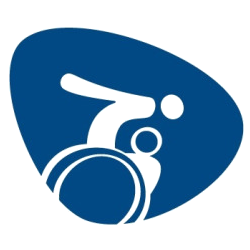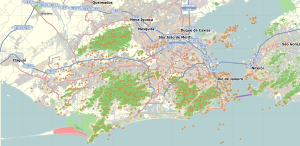
Rio de Janeiro is one of the 27 federative units of Brazil. It has the second largest economy of Brazil, with the largest being that of the state of São Paulo. The state, which has 8.2% of the Brazilian population, is responsible for 9.2% of the Brazilian GDP.
Carioca is a demonym used to refer to anything related to the City of Rio de Janeiro, in Brazil. The original word, "kara'i oka", comes from the indigenous Tupi language meaning "house of carijó", which was Guaraní, a native tribe of Rio de Janeiro who lived in the vicinity of the Carioca River, between the neighborhoods of Glória and Flamengo.
The Campeonato Carioca, officially known as Campeonato Estadual do Rio de Janeiro, was started in 1906 and is the annual football championship in the state of Rio de Janeiro, Brazil. It is under the authority of the FERJ or FFERJ.

America Football Club, usually abbreviated to America, is a Brazilian football team based in the city of Rio de Janeiro, in the northern neighbourhood of Tijuca. The team compete in Campeonato Carioca, the top tier of the Rio de Janeiro state football league.

Volta Redonda Futebol Clube, Volta Redonda or simply by its nickname Voltaço, as they are usually called, is a Brazilian football team from Volta Redonda in Rio de Janeiro, founded on February 9, 1976.

Governador Island is the largest island in Guanabara Bay, in Rio de Janeiro, Brazil. It has a population of about 211,018 inhabitants, in a small area of 42 km2 (16 sq mi).
The Campeonato Carioca Série B1 is the football second level of the First Division annual competition among clubs in the state of Rio de Janeiro, Brazil. Usually, the champion of the level is promoted in the next season to the Campeonato Carioca. It is under the authority of the FERJ or FFERJ.
The Campeonato Carioca de Futebol Feminino, organized by the Rio de Janeiro State Football Federation (FFERJ) is the women's football state championship of Rio de Janeiro State, and is contested since 1983.

Jardim Botânico is a wealthy residential neighborhood of Rio de Janeiro, Brazil, located north of Ipanema and Leblon, just across Lagoa Rodrigo de Freitas and east of Gávea. Jardim Botânico lies in the South Zone of Rio de Janeiro.
The Taça Guanabara, or Guanabara Cup, is a football tournament organized annually since 1965 by the Rio de Janeiro State Football Federation. In its first four editions, the Taça Guanabara was a tournament in its own right, unrelated to the Rio de Janeiro league, and the winner would represent Rio de Janeiro in the Taça Brasil de Futebol national league competition. From 1969 onward, the cup became the first round of the Rio de Janeiro state league.
Funk carioca, also known as favela funk and, in other parts in the world, baile funk, is a hip hop style from Rio de Janeiro, derived from Miami bass and gangsta rap music.

Campo Grande is the largest neighborhood in the West Zone of Rio de Janeiro. Campo Grande has a population of 328,370 inhabitants and an area of 119,1253 sq km, on both counts Rio's largest. It is situated 50 kilometers away from Downtown Rio.

The Federação de Futebol do Estado do Rio de Janeiro, usually known by the acronyms FERJ and FFERJ, manages all the official football tournaments within the state of Rio de Janeiro including the Campeonato Carioca, the Campeonato Carioca Série B1, the Copa Rio, and the Campeonato Carioca de Futebol Feminino. It was founded in 1978.

Cardoso Moreira Futebol Clube, usually known simply as Cardoso Moreira, is a currently inactive Brazilian football club from Cardoso Moreira, Rio de Janeiro state.

Guadalupe is a neighborhood located in the North Zone of Rio de Janeiro, Brazil. It is surrounded by Barros Filho, Honório Gurgel, Marechal Hermes, Deodoro, Ricardo de Albuquerque, Costa Barros and Anchieta. Its designation is a homage to Our Lady of Guadalupe which main church in Rio de Janeiro is located in this neighbourhood. The neighbourhood was built as a project of former Casa Popular Foundation and it was inaugurated by president Getúlio Vargas. Are also notable in the neighbourhood the "Igloos of Guadalupe", a set of houses in hemisphere shape, looking like igloos, and built in the late 1940s on Calama street.

Audax Rio de Janeiro Esporte Clube, commonly known as Audax Rio de Janeiro, Audax Rio, or simply as Audax, is a Brazilian football club from São João de Meriti, Rio de Janeiro state. The club competed in the Série D in 2011. The club was formerly known as Sendas Pão de Açúcar Esporte Clube.

Jardim Sulacap is a neighborhood in the West Zone of Rio de Janeiro, Brazil.

Wheelchair rugby at the 2016 Summer Paralympics will be held in the Rio Olympic Arena, also known as the Arena Carioca, from 14 September to 18 September 2016. There is a single event, for which both genders are eligible, where 8 teams compete.
The 1918 Campeonato Carioca, the thirteenth edition of that championship, kicked off on April 14, 1918 and ended on January 5, 1919. It was organized by LMDT. Ten teams participated. Fluminense won the title for the 7th time. No teams were relegated.










